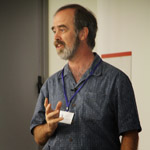Interview with Terence Deacon

This post-lecture interview was conducted during the BCBT Summerschool held at the Universitat Pompeu Fabra, Barcelona, september 2010.
The 'Evo-Devo' approach to the study of the brain's structure, pivots around the notion of competition. Evolution theory since Darwin has built upon the principal idea of regularities and variations of body part shapes, that compete over function in changing environments, and are either kept or discarded as a consequence of success. Terence Deacon (University of California, Berkeley) connects this idea to both the evolution, and the development of the brain, and argues that the way brain development during an animal's life has evolved over ages has resulted in the specific forms and function of brain parts on one hand, and on the other in the relative similarity of formal and functional brain organization amongst different species. He introduces the notion of an essential competition of neuron connections in the final stages of brain development, one that is staged by genes that code for different functional brain areas. With Paul Verschure he discusses theoretical and experimental aspects of such a notion, and illustrates it with his research on parkinson patients that involved the transplantation of embryonic pig brain tissue into the affected human brain areas. In the final part, he introduces his current research ideas on evolution and the origins of life, from a perspective beyond self-replicating mechanisms that use DNA and RNA, and even away from molecular replication we can find on earth.
About the lecturerTerence Deacon is Professor in Biological Anthropology and Linguistics at the University of California Berkley, USA. His interests combine human evolutionary biology, and neuroscience, with the aim of investigating the evolution of human cognition. His research extends from laboratory-based cellular-molecular neurobiology, to the study of semiotic processes underlying animal and human communication, especially language. Many of these interests are explored in his 1997 book, The Symbolic Species: The Coevolution of Language and the Brain.